by的用法
by的六种用法
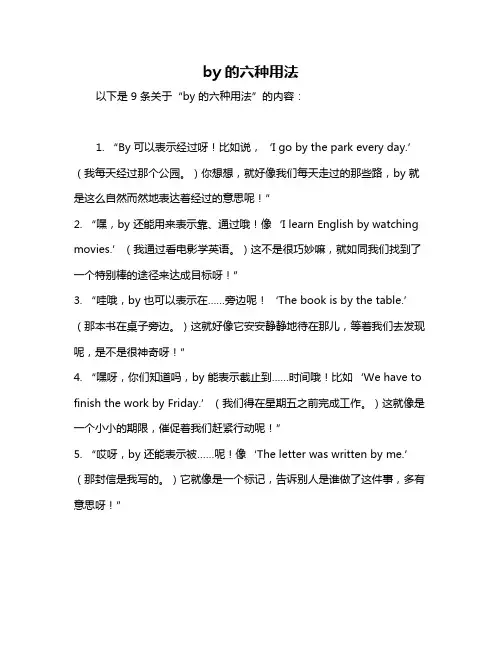
by的六种用法以下是 9 条关于“by 的六种用法”的内容:1. “By 可以表示经过呀!比如说,‘I go by the park every day.’(我每天经过那个公园。
)你想想,就好像我们每天走过的那些路,by 就是这么自然而然地表达着经过的意思呢!”2. “嘿,by 还能用来表示靠、通过哦!像‘I learn English by watching movies.’(我通过看电影学英语。
)这不是很巧妙嘛,就如同我们找到了一个特别棒的途径来达成目标呀!”3. “哇哦,by 也可以表示在……旁边呢!‘The book is by the table.’(那本书在桌子旁边。
)这就好像它安安静静地待在那儿,等着我们去发现呢,是不是很神奇呀!”4. “嘿呀,你们知道吗,by 能表示截止到……时间哦!比如‘We have to finish the work by Friday.’(我们得在星期五之前完成工作。
)这就像是一个小小的期限,催促着我们赶紧行动呢!”5. “哎呀,by 还能表示被……呢!像‘The letter was written by me.’(那封信是我写的。
)它就像是一个标记,告诉别人是谁做了这件事,多有意思呀!”6. “哇,by 还能用于一些固定短语里哦,像‘by the way’(顺便说一下)。
每次听到这个,就感觉是有人突然想起什么重要的事,要赶紧说出来一样呢!”7. “你们发现没有,by 可以表示按照哦!比如‘Do it by the rules.’(按照规则做。
)它就像是一个指引,让我们沿着正确的方向前进呀!”8. “哈哈,by 还能表示以……方式呢!像‘I solve the problem by myself.’(我自己解决问题。
)这多能体现出我们的能力和独立性呀!”9. “总之呢,by 有这么多种奇妙的用法,每种都很重要呀!它就像我们语言中的一个小精灵,在不同的情境中变幻出不同的作用。
by作副词的用法
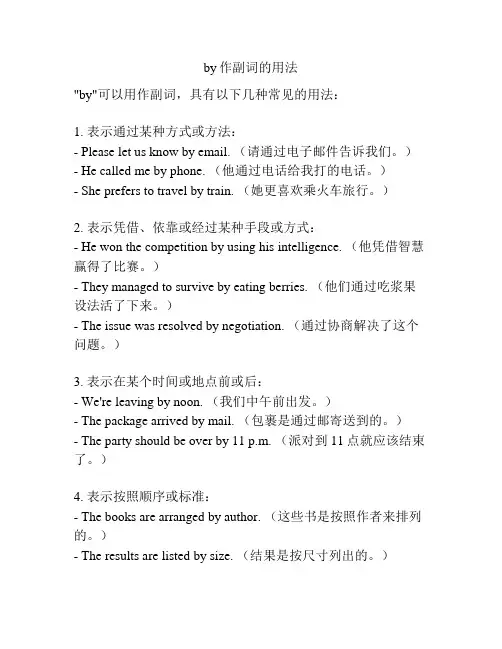
by作副词的用法"by"可以用作副词,具有以下几种常见的用法:1. 表示通过某种方式或方法:- Please let us know by email. (请通过电子邮件告诉我们。
)- He called me by phone. (他通过电话给我打的电话。
)- She prefers to travel by train. (她更喜欢乘火车旅行。
)2. 表示凭借、依靠或经过某种手段或方式:- He won the competition by using his intelligence. (他凭借智慧赢得了比赛。
)- They managed to survive by eating berries. (他们通过吃浆果设法活了下来。
)- The issue was resolved by negotiation. (通过协商解决了这个问题。
)3. 表示在某个时间或地点前或后:- We're leaving by noon. (我们中午前出发。
)- The package arrived by mail. (包裹是通过邮寄送到的。
)- The party should be over by 11 p.m. (派对到11点就应该结束了。
)4. 表示按照顺序或标准:- The books are arranged by author. (这些书是按照作者来排列的。
)- The results are listed by size. (结果是按尺寸列出的。
)5. 表示乘坐或使用某种交通工具或手段:- They traveled to the beach by car. (他们开车去海滩。
)- I usually go to work by bus. (我通常乘公交车上班。
)注意:有时候,"by"也可以作为介词使用,表示"通过"、"由"等含义。
by的用法总结 例句
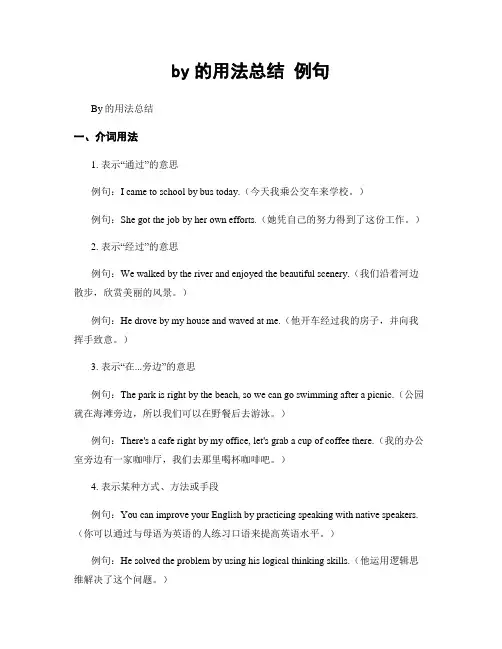
by的用法总结例句By的用法总结一、介词用法1. 表示“通过”的意思例句:I came to school by bus today.(今天我乘公交车来学校。
)例句:She got the job by her own efforts.(她凭自己的努力得到了这份工作。
)2. 表示“经过”的意思例句:We walked by the river and enjoyed the beautiful scenery.(我们沿着河边散步,欣赏美丽的风景。
)例句:He drove by my house and waved at me.(他开车经过我的房子,并向我挥手致意。
)3. 表示“在...旁边”的意思例句:The park is right by the beach, so we can go swimming after a picnic.(公园就在海滩旁边,所以我们可以在野餐后去游泳。
)例句:There's a cafe right by my office, let's grab a cup of coffee there.(我的办公室旁边有一家咖啡厅,我们去那里喝杯咖啡吧。
)4. 表示某种方式、方法或手段例句:You can improve your English by practicing speaking with native speakers.(你可以通过与母语为英语的人练习口语来提高英语水平。
)例句:He solved the problem by using his logical thinking skills.(他运用逻辑思维解决了这个问题。
)五、表示“根据”的意思例句:By the look on her face, I knew something was wrong.(通过她脸上的表情,我知道有些事情出了问题。
)例句:By my calculation, we should reach our destination in a few hours.(根据我的计算,我们应该在几个小时内到达目的地。
by的介词用法归纳
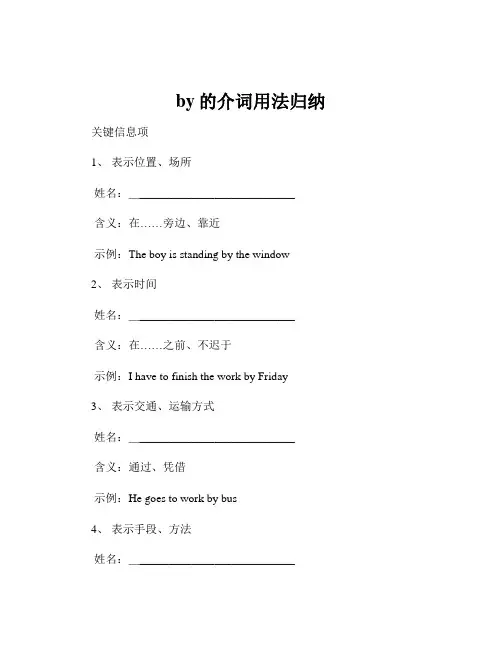
by的介词用法归纳关键信息项1、表示位置、场所姓名:____________________________含义:在……旁边、靠近示例:The boy is standing by the window2、表示时间姓名:____________________________含义:在……之前、不迟于示例:I have to finish the work by Friday3、表示交通、运输方式姓名:____________________________含义:通过、凭借示例:He goes to work by bus4、表示手段、方法姓名:____________________________含义:用、靠、通过示例:She made the cake by hand5、表示动作执行者姓名:____________________________含义:被、由示例:The book was written by him11 表示位置、场所By 用作介词表示位置或场所时,常指在某物或某人的旁边、靠近。
例如:“The chair is by the table”(椅子在桌子旁边。
)“He sat by me in the cinema”(在电影院他坐在我旁边。
)这种用法通常强调两者之间的相对位置关系较近。
111 相关短语与 by 表示位置相关的常见短语有“by the side of”(在……旁边),如:“There is a small house by the side of the river”(河边有一座小房子。
)“by oneself”(独自),例如:“She did the work by herself”(她独自完成了这项工作。
)12 表示时间当 by 用于表示时间时,意思是“在……之前、不迟于”。
比如:“You should be back by six o'clock”(你应该在六点之前回来。
by用法总结以及短语
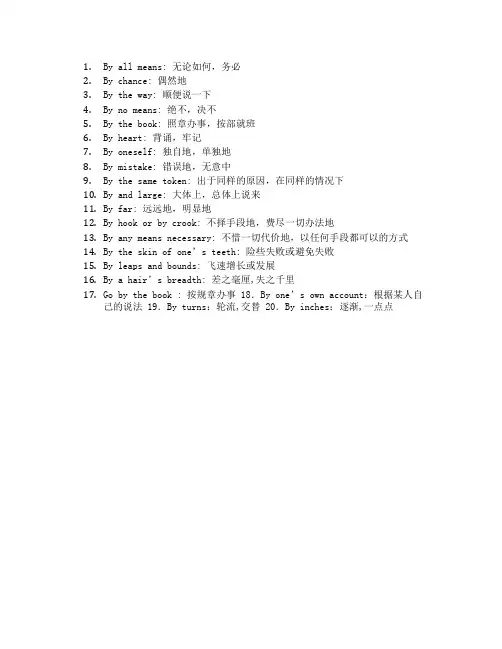
1.By all means: 无论如何,务必
2.By chance: 偶然地
3.By the way: 顺便说一下
4.By no means: 绝不,决不
5.By the book: 照章办事,按部就班
6.By heart: 背诵,牢记
7.By oneself: 独自地,单独地
8.By mistake: 错误地,无意中
9.By the same token: 出于同样的原因,在同样的情况下
10.By and large: 大体上,总体上说来
11.By far: 远远地,明显地
12.By hook or by crook: 不择手段地,费尽一切办法地
13.By any means necessary: 不惜一切代价地,以任何手段都可以的方式
14.By the skin of one’s teeth: 险些失败或避免失败
15.By leaps and bounds: 飞速增长或发展
16.By a hair’s breadth: 差之毫厘,失之千里
17.Go by the book : 按规章办事 18.By one’s own account:根据某人自
己的说法 19.By turns:轮流,交替 20.By inches:逐渐,一点点。
by的用法总结大全
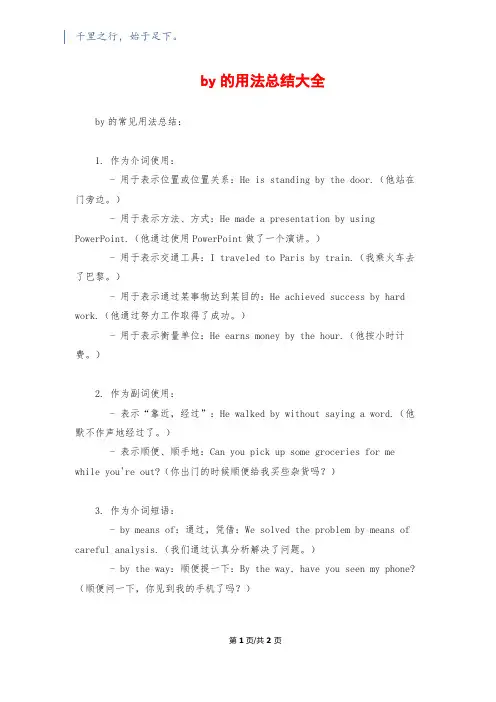
千里之行,始于足下。
by的用法总结大全by的常见用法总结:1. 作为介词使用:- 用于表示位置或位置关系:He is standing by the door.(他站在门旁边。
)- 用于表示方法、方式:He made a presentation by using PowerPoint.(他通过使用PowerPoint做了一个演讲。
)- 用于表示交通工具:I traveled to Paris by train.(我乘火车去了巴黎。
)- 用于表示通过某事物达到某目的:He achieved success by hard work.(他通过努力工作取得了成功。
)- 用于表示衡量单位:He earns money by the hour.(他按小时计费。
)2. 作为副词使用:- 表示“靠近,经过”:He walked by without saying a word.(他默不作声地经过了。
)- 表示顺便、顺手地:Can you pick up some groceries for me while you're out?(你出门的时候顺便给我买些杂货吗?)3. 作为介词短语:- by means of:通过,凭借:We solved the problem by means of careful analysis.(我们通过认真分析解决了问题。
)- by the way:顺便提一下:By the way, have you seen my phone?(顺便问一下,你见到我的手机了吗?)第1页/共2页锲而不舍,金石可镂。
- by all means:务必,无论如何:By all means, go ahead and ask for help if you need it.(无论如何,假如需要的话,请尽管去寻求挂念。
)4. 作为连词使用:- 表示“通过这种方式”:By this means, we can accomplish our goal.(通过这种方式,我们能够达成目标。
by的用法归纳及例句
by的用法归纳及例句一、By的基本用法归纳By是一个常见的英语介词,它有多种用法。
在本文中,我们将归纳总结by的基本用法,并通过例句加以说明。
1. 表示方式或方法By可表示某事物实现或发生的方式或方法。
例如:- He travels by train.(他乘火车旅行。
)- We communicate by email.(我们通过电子邮件交流。
)2. 表示经过某段时间By可用于描述经过了多长时间才达到某一事件或状态。
例如:- I will finish the report by tomorrow.(我将在明天前完成报告。
)- She will be back home by seven o'clock. (她将在七点之前回家。
)3. 表示被动动作的执行者By也可以表示一个动作的执行者,特别适用于被动语态。
例如:- The book was written by Shakespeare.(这本书是莎士比亚写的。
)- The museum was founded by a group of art enthusiasts.(这个博物馆是由一群艺术爱好者创建的。
)4. 表示陪同、伴随By除了表示方式和方法外,还可表示陪同、伴随等意义。
例如:- She always likes to have a cup of tea by her side when reading a book.(她读书时总是喜欢有一杯茶在身边。
)- The children walked by their parents' side in the park.(孩子们在公园里跟随父母走。
)5. 表示依靠、凭借By可以表示某人凭借的手段或依托的对象。
例如:- He made a fortune by investing in stocks.(他通过投资股票谋财。
)- She succeeded in her career by sheer determination and hard work.(她凭着坚定的决心和努力获得了事业成功。
by的用法
博学笃行自强不息
by的用法
By的用法
By是一个常见的英语词汇,在不同的语境下有不同的意思和用法。
它可以作为介词、副词、连词和一个非正式的缩略语。
在本文中,
我们将探讨By的不同用法,并给出一些例句来帮助大家更好地理解。
1. 作为介词:
作为介词,By用于表示通过某种手段或方式来实现某事。
它可以表示时间、方式、原因等。
以下是一些常见的用法:
- By means of(通过):
- We can solve this problem by means of technology.
(我们可以通过技术来解决这个问题。
)
- He escaped by means of a secret passage.
(他通过一个秘密通道逃脱了。
)
1。
by的种种用法
爱英语介词by 是中考考点词汇,其常见的用法如下:1.表示“乘(某交通工具)”。
后接交通工具的名词,前面一般不用冠词。
如by bus 、by bike 、by ship 、by air 、by subway 等。
2.表示“通过;靠(某种方式)”。
后接通信工具等名称,前面不用冠词。
如by phone 、by telegraph 、by Internet 、by QQ 、by WeChat 等。
3.表示“被;由;受到”。
含被动意思,多用于被动语态。
例如:The novel is written by Mo Yan.这本小说是莫言写的。
4.表示“不迟于……;在……前”。
后接将来时间,通常修饰将来时态;后接过去时间,修饰过去完成时态。
例如:Can you finish the work by next Friday?下周五之前你能完成工作吗?They had built five big bridges by last October.截至去年十月份,他们已经建造了五座大桥。
5.表示“在……的旁边”。
后面接名词。
如by the river 、by the win ⁃dow 、by Bob 等。
6.表示“按照;依据”。
后面可以接名词或代词。
例如:We are paid by the hour.我们按小时计薪酬。
7.表示“上升(下降)了……”。
表示由于变化而产生的差异程度,与rise 、fall 、drop 、increase 、decrease 、go up 、go down 等词语搭配使用。
例如:The price of the apples has risen /in ⁃creased by one yuan a kilogram.苹果的价格每千克上升了1元钱。
8.表示“从……旁边经过”。
by 表示此含义时,常和动词run 、walk 、rush 等搭配。
例如:He walked by the library five minutes ago.五分钟前他经过图书馆。
归纳by的用法
归纳by的用法关键信息项:1、表示“通过;凭借”举例:____________________________详细解释:____________________________ 2、表示“在……旁边;靠近”举例:____________________________详细解释:____________________________ 3、表示“被;由”举例:____________________________详细解释:____________________________ 4、表示“按照;依据”举例:____________________________详细解释:____________________________ 5、表示“在……之前;不迟于”举例:____________________________详细解释:____________________________11 “by”表示“通过;凭借”当“by”表示“通过;凭借”的意思时,通常用于描述达成某个结果或完成某个动作所使用的方式、手段或途径。
例如:“I learn English by reading a lot”(我通过大量阅读来学习英语。
)在这个句子中,“by reading a lot”说明了学习英语所采用的方式是大量阅读。
再比如:“The man made a living by fishing”(这个男人靠捕鱼谋生。
)这里“by fishing”表示谋生的手段是捕鱼。
111 相关的固定搭配常见的有“by oneself”(独自)、“by means of”(借助于;依靠)等。
如:“She did the work by herself”(她独自完成了这项工作。
)“We solved the problem by means of hard work”(我们通过努力工作解决了这个问题。
)12 “by”表示“在……旁边;靠近”这种用法常用来描述位置或地点关系。
- 1、下载文档前请自行甄别文档内容的完整性,平台不提供额外的编辑、内容补充、找答案等附加服务。
- 2、"仅部分预览"的文档,不可在线预览部分如存在完整性等问题,可反馈申请退款(可完整预览的文档不适用该条件!)。
- 3、如文档侵犯您的权益,请联系客服反馈,我们会尽快为您处理(人工客服工作时间:9:00-18:30)。
by 用法小结
1.用于被动语态的句子中,表示动作的执行者,意为“被;由”。
He was praised by the teacher.他受到了老师的表扬。
The book was written by Lu Xun.这本书是鲁迅写的。
2.表示方式、方法、手段等,后常接无冠词的名词或动名词,意为“通过;靠;用”。
Don't judge a person by appearances. 勿以貌取人。
He made a living by teaching.他以教书为生。
3.表示时间,意为“到…时为止”或“不迟于... by now/then/this time/next Friday/the end of/three o’clock Mum told me to come back by 10 o’clock.
By the time he was ten, he had learnt about 1,000 English words.
到十岁时,他已学了1000个英语单词。
4. by+交通工具、交通方式名词(名词前不加冠词,不变复数)。
意为:“通过…,由…,乘…”。
by train/rail/tube/taxi/bus/truck/bike/boat/plane; by land/road/sea/water/air等。
(on foot)
5. by+地点名词:表方位,意为:“在…旁边”。
by the lake/river/tree/window/door;sit by my side
6.“从…旁经过”,多与动词go/walk/pass等连用。
pass by经过
7. by accident偶然,意外的
8. by mistake错误的,无意中
9. by chance碰巧
10. by the end of 在(某时间点)以前
注意联系:in the end/ at the end of…
11. by the way顺便说一下
12. one by one一个接一个
13. step by step一步一步地,逐步地
14. by oneself独自
15. learn…by heart用心学…
16. What do you mean by saying that? 你那样说什么意思?
17. by means of用,依靠; 将; 借助于
We express our thought by means of words. 我们用词句来表达思想。
